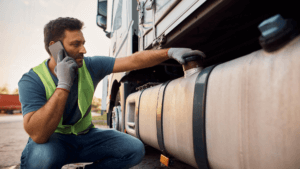Are you hitting the road in your RV only to find that your water heater is acting up? Don’t let a malfunctioning water heater put a damper on your travels. In this blog post, we’ll dive into some common problems RV owners face with their water heaters and provide you with simple fixes to get you back to enjoying hot showers and cozy evenings in no time. Let’s troubleshoot together!
Time for maintenance? Contact Elluminate Service now.
Why having a working water heater is important for RV travel
RV travel offers a unique and exciting way to explore the world, with the freedom to go wherever the road takes you. However, as with any type of traveling, there are certain challenges that come along with it. One of these challenges is ensuring that you have access to hot water for all your daily needs.
The most obvious reason is that hot water makes life on the road much more comfortable and convenient. After a long day of driving or outdoor activities, there’s nothing like taking a warm shower to relax and rejuvenate yourself. Additionally, having hot water for cooking or doing dishes makes meal preparation easier and more enjoyable.
Hot water plays an essential role in maintaining good hygiene while traveling in an RV. It helps kill germs and bacteria when washing hands or cleaning utensils. Moreover, taking regular showers with hot water can prevent skin infections caused by dirt build-up.
We recommend you to see this article: Emergency Truck Repair: Most Common Fix Tricks
Types of RV Water Heaters
1. Propane Water Heaters: Propane water heaters are the most common type found in RVs. They use propane gas as their primary source of fuel, making them efficient and cost-effective. These heaters have a tank that stores cold water, which is then heated by a burner powered by propane gas. The heated water then flows out through a pipe for use.
2. Electric Water Heaters: Electric water heaters are another popular option for RVs. As the name suggests, these heaters run on electricity instead of propane gas. They come with a heating element that heats up the stored cold water inside the tank and sends it out through a pipe for usage.
3. Hybrid/Combo Water Heaters: This type combines both propane gas and electricity as sources of fuel for heating water in your RV. Hybrid/combo heaters provide more flexibility when it comes to choosing between power sources, making them ideal for extended trips where one may not always have access to electricity.
Elluminate saves you time and money to keep you moving, contact us today.
Components of an RV Water Heater
1.Tank: The tank is the main component where cold water is stored and heated before being distributed throughout your RV.
2.Burner/Heating Element: The burner (for propane) or heating element (for electric) is responsible for heating up the stored cold water in the tank so that it can be used as hot water.
3.Thermostat: The thermostat is a temperature control device that regulates the temperature of the water in the tank. It prevents the water from getting too hot or too cold and maintains it at an optimal temperature for usage.
4.Pressure Relief Valve: This valve releases pressure inside the tank to prevent it from exploding due to built-up pressure. It’s a safety feature that every RV water heater should have.
5.Drain Valve: The drain valve is used to empty out the tank when you need to replace its contents or perform maintenance on your water heater.
We recommend you to see this article: Mobile Truck Repair: A Step-by-Step Guide for Common Roadside Challenges
Tips for maintenance and prevention of future problems
As with any appliance, regular maintenance is key to ensuring your RV water heater runs smoothly and efficiently. By following these simple tips, you can not only prevent future problems but also extend the lifespan of your water heater.
1. Regularly flush the tank: It is important to flush out your RV water heater at least once a year to remove any sediment or mineral buildup that may cause clogs and reduce efficiency. To do this, turn off the power and water supply to the heater, open the pressure relief valve, and drain all the water from the tank.
2. Check for leaks: Keep an eye out for any leaks around your water heater, especially after flushing it out or during use. Leaks can indicate a potential problem with fittings or valves that need to be addressed immediately.
3. Inspect the anode rod: The anode rod is responsible for attracting corrosive elements in the tank, protecting it from rusting. However, over time, this rod will deteriorate and need replacement. It is recommended to check and replace if necessary every 2-3 years.
4. Test the pressure relief valve: This valve helps regulate temperature and pressure inside the tank by releasing excess steam or hot water when needed. To test it, simply lift up on its lever until you hear a rush of air escape.
5. Keep vents clear: Make sure there are no obstructions around your RV’s external vents as they provide crucial ventilation for your water heater.
Whether you need truck or trailer repairs, our knowledgeable staff is here to make the process as hassle-free as posible, contact us now!
When to call a professional
When it comes to troubleshooting your RV water heater, there are certain issues that you may be able to fix on your own. However, there are also situations where calling a professional is necessary. Here are some guidelines for when it’s time to seek the help of a trained expert.
1. No Hot Water: If your RV water heater is not producing any hot water at all, this could be a sign of a more serious issue that requires the expertise of a professional. It could be due to a malfunctioning thermostat, heating element, or even an electrical problem. Attempting to fix these problems yourself can be dangerous and may result in further damage or injury.
2. Leaks: Any signs of leakage from your RV water heater should never be ignored. This could indicate a cracked tank or loose fittings which need specialized tools and techniques to repair properly. A professional plumber will have the necessary skills and experience to diagnose and fix the source of the leak effectively.
3. Strange Noises: Unusual sounds coming from your water heater such as popping, rumbling, or banging noises are usually indicative of sediment buildup inside the tank. While draining and flushing out the tank can sometimes resolve this issue, if it persists then contacting a professional is advised. These noises could also signal more serious problems like a faulty burner assembly or gas valve which require specialized knowledge and equipment to fix.
4. Gas Smell: If you detect any smell of gas around your RV water heater, immediately turn off the gas supply and contact a professional plumber right away for safety reasons. This could indicate a major gas leak which poses serious hazards such as fire or explosion if left unaddressed.
We recommend you to see this article: On-the-Road Semi Repairs: Mastering Quick Fixes
For more tips and info, follow us on Facebook and Instagram. Call us for truck repair road service on: elluminatemobiletruckrepair.com






